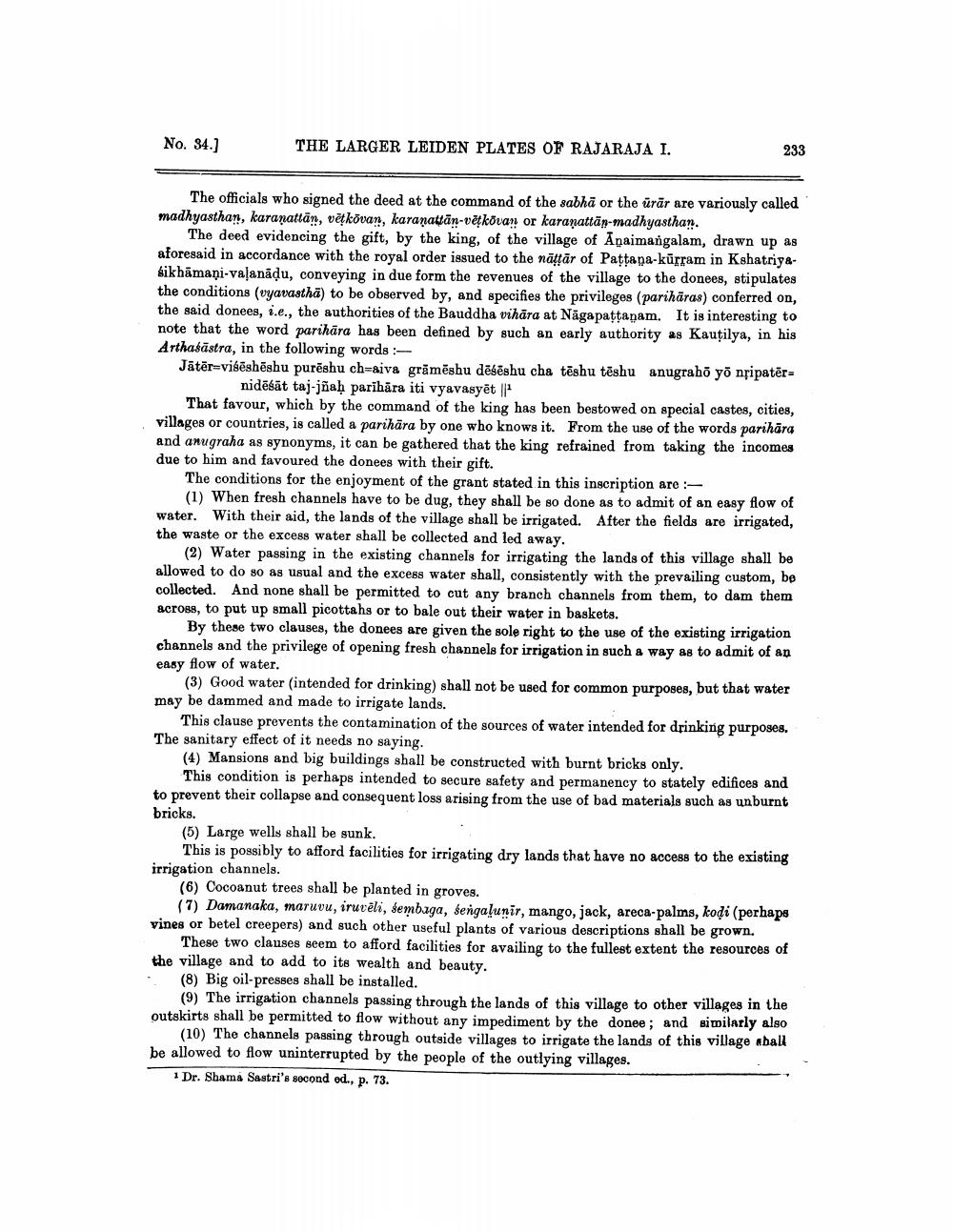________________
No. 34.]
THE LARGER LEIDEN PLATES OF RAJARAJA I.
233
The officials who signed the deed at the command of the sabha or the urar are variously called madhyasthan, karaṇattan, vetkovan, karanattan-vētkovan or karanattan-madhyasthan.
The deed evidencing the gift, by the king, of the village of Anaimangalam, drawn up as aforesaid in accordance with the royal order issued to the naṭṭār of Paṭṭana-kurram in Kshatriyasikhamani-valanaḍu, conveying in due form the revenues of the village to the donees, stipulates the conditions (vyavastha) to be observed by, and specifies the privileges (parihāras) conferred on, the said donees, i.e., the authorities of the Bauddha vihara at Nagapaṭṭanam. It is interesting to note that the word parihara has been defined by such an early authority as Kautilya, in his Arthasästra, in the following words :
Jäter visesheshu purēshu ch-aiva grāmēshu dēśēshu cha teshu teshu anugrahō yō nripatēr= nidēsāt taj-jñaḥ parihāra iti vyavasyēt ||1
That favour, which by the command of the king has been bestowed on special castes, cities, villages or countries, is called a parihara by one who knows it. From the use of the words parihāra and anugraha as synonyms, it can be gathered that the king refrained from taking the incomes due to him and favoured the donees with their gift.
The conditions for the enjoyment of the grant stated in this inscription are:
(1) When fresh channels have to be dug, they shall be so done as to admit of an easy flow of water. With their aid, the lands of the village shall be irrigated. After the fields are irrigated, the waste or the excess water shall be collected and led away.
(2) Water passing in the existing channels for irrigating the lands of this village shall be allowed to do so as usual and the excess water shall, consistently with the prevailing custom, be collected. And none shall be permitted to cut any branch channels from them, to dam them across, to put up small picottahs or to bale out their water in baskets.
By these two clauses, the donees are given the sole right to the use of the existing irrigation channels and the privilege of opening fresh channels for irrigation in such a way as to admit of an easy flow of water.
(3) Good water (intended for drinking) shall not be used for common purposes, but that water may be dammed and made to irrigate lands.
This clause prevents the contamination of the sources of water intended for drinking purposes. The sanitary effect of it needs no saying.
(4) Mansions and big buildings shall be constructed with burnt bricks only.
This condition is perhaps intended to secure safety and permanency to stately edifices and to prevent their collapse and consequent loss arising from the use of bad materials such as unburnt bricks.
(5) Large wells shall be sunk.
This is possibly to afford facilities for irrigating dry lands that have no access to the existing irrigation channels.
(6) Cocoanut trees shall be planted in groves.
(7) Damanaka, maruvu, iruvēli, sembaga, sengalunir, mango, jack, areca-palms, kodi (perhaps vines or betel creepers) and such other useful plants of various descriptions shall be grown.
These two clauses seem to afford facilities for availing to the fullest extent the resources of the village and to add to its wealth and beauty.
(8) Big oil-presses shall be installed.
(9) The irrigation channels passing through the lands of this village to other villages in the outskirts shall be permitted to flow without any impediment by the donee; and similarly also (10) The channels passing through outside villages to irrigate the lands of this village shall be allowed to flow uninterrupted by the people of the outlying villages.
1 Dr. Shama Sastri's second ed., p. 73.




